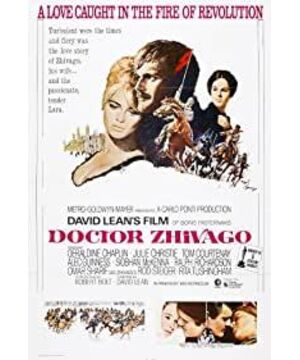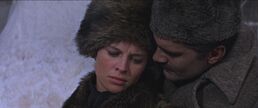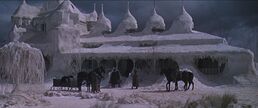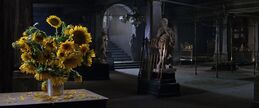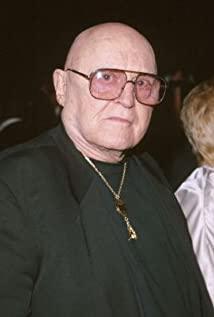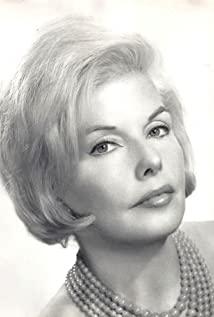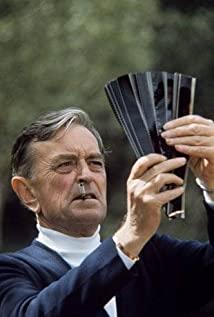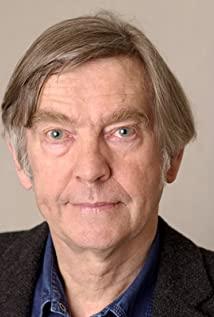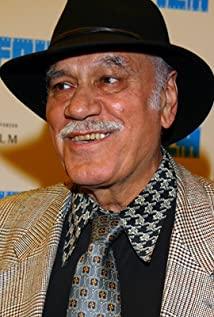Don’t sleep, don’t sleep, artists don’t give in to your dreams. You are an eternal hostage. You are a captive of time. This is the last verse of Boris Pasternak’s lyric poem "Night", from which we can taste this The poet's persistent pursuit of art and his integrity and tenacious character. Just as the British philosopher Berlin highly praised him: "He is the last and greatest representative of the so-called Silver Age in the history of Russian literature. It is difficult to think of someone who is talented, energetic, Someone who can be compared in terms of unshakable integrity, moral courage, and perseverance.” When we have a little knowledge of the original author, and then look back at this "Doctor Zhivago", perhaps we can truly Experience the greatness inside. Pasternak had a rough life. Due to his background and early education, he and his works were often incompatible with the workers, peasants, and soldiers who grew up after the October Revolution in Russia. Therefore, he was always excluded from the circle of writers and writers. The cold encounter, and the event that hit it hardest was the "Nobel Prize Disturbance." In 1958, Pasternak was awarded the Nobel Prize for Literature by the Swedish Academy for his novel "Doctor Zhivago." The various experiences at the time of publication angered the leaders of the Soviet Union and the senior writers of the Writers Association. They used strong political pressure and public opinion, and even threatened intimidation to force him to make a statement that he refused to accept the award, which severely damaged his body and mind. As a result, he became the only writer in the history of the Nobel Prize who not only never won the honor for winning, but incurred humiliation and disaster. More than a year later, under the attack of illness and depression, Pasternak died in his apartment on the outskirts of Moscow. To some extent, "Doctor Zhivago" can almost be regarded as the author's autobiography. The protagonist Zhivag received a good education since he was a child. He is pure-hearted and knowledgeable. He is proficient in medicine and is also a famous poet. He was frustrated when he was helpless, and experienced the most turbulent years in Russian history. His talent and ambition formed a strong contrast with the hardships of life, and he finally died of a heart attack in the streets of Moscow in loneliness and collapse. Zhivag’s identity as a poet, his understanding of various issues, and his ill-fated life all have similarities with Pasternak himself.Through the tragic life of this character, the novel reveals the confusion and thinking of liberal intellectuals of that era about the October Revolution and a series of political movements and social phenomena afterwards, and more importantly, the cherishment and deeds of art and dignity. The determination to defend to the end.
It is quite difficult to adapt such a huge film into a movie, and it is not easy for director David Lean to condense it into more than three hours. In terms of format, the film version of "Doctor Zhivago" inherits the epic grandeur of the original book. From the six or seven-minute overture, the film is divided into two acts, and the intermission must be added to the interlude. From the song, you can see the director's meticulous craftsmanship and dedication. The visual and auditory intuitive feelings are even more obvious: the seasons change, the vast wilderness (especially the winter covered in silver), and the melodious and beautiful soundtrack (especially the theme song "Song of Lala" ) Left a very deep impression on people. The magnificent natural environment and the cycle of the four seasons not only contrast with the sorrows and moods of the characters' fate, but also reflect the insignificance of the individual in the torrent of the times, and the music has played a role in fueling emotions, making people love the protagonist. The hope and sorrow once were filled with emotion. There are two main factors that have entangled Zhivag throughout his life and caused his tragic fate. They are also the two main lines of the film, one is love and the other is ideal. I have seen some film critics criticizing the film’s love, thinking that this is just a story about derailment, and Zhivag is just a man who betrayed his wife, betrayed his family, and has no sense of responsibility. It is true that there is some truth to this statement, but it is one-sided and narrow, ignoring the influence of the background of the times and the personalities of the characters. Many love stories cannot be purely on the matter, but should be evaluated under the relevant settings of the film. For example, "Titanic" and "Covered Bridge Last Dream", if we do not consider the disaster background of the shipwreck in the ice sea in the former, or the living conditions of Robert and Francesca in the latter, then these two love stories will also be reduced to " "Red Apricot Goes out of the Wall" cliché. The same is true for the triangle relationship between Zhivag, Tonya, and Lara. Although Zhivag and his wife, Tonya, have little guesswork and deep affection, and Tonya has a three-point respect for the poet in addition to love for Zhivag. However, for Zhivag, a gentle, virtuous, well-mannered Tonia is not a true soul mate, and cannot inspire and inspire him in art. A similar situation is also reflected in the author. When Pasternak was squeezed out and his soul dried up, his wife Nihaus could not resonate with him spiritually due to cultural differences, so she met him. When I arrived at Evanskaya, the spark of love was immediately ignited. And Ivanskaya is also the prototype of Lala. Lala and Zhivag not only share a friendship (working as a medical worker in the army), her outstanding beauty and her strong personality are all made up of Zhivagsi. Source of inspiration. Of course, Zhivag is not completely guilty of his wife. If he had not made up his mind to completely end the relationship with Lala, Zhivag would not be arrested by the guerrillas as a military doctor, so that he and his family would be separated from each other.
If "love" adds some variables to Zhivag's rough fate, then "idea" is the decisive source. Zhvag has gone through a series of major events in the modern history of Russia. The First World War, the two successive Russian revolutions, the Russian civil war, the anti-revolutionary movement, and so on. While causing continuous and devastating war in Russia, these events also made Russia in The political, economic and cultural fields have triggered earth-shaking changes. In the face of sudden changes, Zhivag naturally fell into confusion, and this also represented the general reaction of the majority of Russian liberal intellectuals. For the October Revolution and for the Bolsheviks, they went from sympathy to incomprehension to hatred, and their dehumanizing and dehumanizing behaviors eventually made them desperate. The section where the Zivags were forced to take a train from Moscow to the Ural region was the driving force that prompted him to recognize reality, and it was also a very exciting section in the film. Although in Moscow, the middle class represented by his adoptive father (and father-in-law) was persecuted to a certain extent, Zhivag saw even more shocking scenes during the train journey. The low-level people were hungry, cold, and homeless. Even the Red Army itself is slack, like a demon that kills without blinking an eye. This was a huge blow to Zhivag, who was innocent and kind and respected life, and finally made him choose to live alone and use poetry to distract his mind. Zhivag hesitated in love, but was full of courage for his ideals. Especially when he was coerced and lured by Komarovsky, he showed the integrity that he would rather be a jade than a complete one, but he failed to prevent Lara from being taken away by Komarovsky. Perhaps this is the sorrow of being a liberal intellectual. As a liberal, he can adhere to his ideals and principles; but as an intellectual, he is unarmed and has no strength to defend his lover and family. It’s a pity that although the original novel is a masterpiece that reflects on history, accuses violence, and reflects human nature, in the movie, David Lean cuts or simplifies the parts that involve history and political consciousness, which greatly reduces The ideological profoundness of the work, so some people criticized the film for "just telling a pale romance, more like a romantic movie set against the background of a great era". However, the flaws are not concealed. Aside from ideology, the film's artistic achievements in narrative, photography, soundtrack, and performance are obvious to all, enough to accompany the well-known "Song of Lala" for a long time. At the end of the film, Zhivago's poems were finally approved for distribution by the government, which also attracted many readers to pay tribute to his tombstone. Just as Pasternak wrote in the letter to the Presidium of the Writers Association in the "Nobel Prize Disturbance": "I did not expect you to treat me fairly. You can shoot me, put me in exile, you will do everything. I can do it. I forgive you in advance. But you don’t need to be too rushed. This will not bring you happiness, nor will it add brilliance. You remember that in a few years you will have to vindicate me. In yours This is not the first time in practice." Forces that violate morality and humanity may gain momentum for a while, but history will eventually return "justice" to innocence.
♑
View more about Doctor Zhivago reviews


